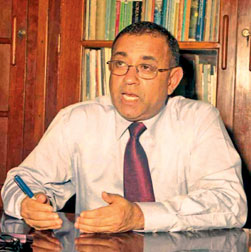Knowledge-based industries will reach $ 10 b
By Gamini WARUSHAMANA
The Sri Lankan economy has transformed to a service economy and only
services that can be sustained in the future will be knowledge-based,
said the Secretary to the Treasury Dr. P.B. Jayasundera. He was
addressing the CIO Council meeting of SLASSCOM in Colombo last week.
 |
|
P.B. Jayasundera |
Delivering the keynote address on “Sri Lanka beyond 2011 - The role
of the industry to support the knowledge economy”, Dr. Jayasundera said
that the government is doing its best as the facilitator of the economy.
The corporate sector should take the lead and engage more aggressively
in its role as the key player of the economy.
Dr. Jayasundera who compared pre and post war economic statistics
expressed his doubt over the trickling down of benefits of peace
dividends to all segments of society. However, he said that corporate
profits have increased significantly in many industries.
The corporate sector has recovered and they are earning huge profits.
Banking, insurance and finance companies are performing well. Banks are
recording a less than 4 percent NPL ratio reflecting low risk of
lending, he said.In the 1990s the size of the economy was $20 billion,
international trade was $ 5 billion and the service sector was 40
percent of the GDP. Throughout the period Sri Lanka faced internal and
external shocks.Most of the time we were in a conflict. The economic
crisis in many regions, oil shock and global economic crisis in 2008 and
2009 hardly hit the Sri Lankan economy. However, we sustained, survived,
grew and achieved. Today the size of the economy is $50 billion.
International trade has passed $ 20 billion. The service sector has
evolved to two thirds of the economy. The unemployment rate has dropped
to 5 percent. Poverty has dropped from 21.2 percent in the 1990s to 7.2
percent.
The Exchange Rates and interest rates are market driven. The
financial system, and trade are liberalised and exchange control
relaxed. Apart from a few areas the capital account is open. Value
addition in Sri Lankan exports is high and now we have our own tea
brands. We export value added high branded rubber instead of raw rubber.
The $ 3 billion apparel industry is competitive and resilient without
protected markets in USA are concessions from the EU.
The tourism industry is booming and tourist arrivals have reached
700,000. Hotels are operating to their full capacity after 20 years.
The average spending of tourists too is increasing and new
investments are coming in. Foreign remittances have reached $4.5
billion.
Not only in numbers but in the changed composition of the jobs from
unskilled, semi skilled and skilled in the expatriated workforce who
contribute to the increased foreign remittence.
Knowledge-based services may increase further and it will reach $10
billion. With investment on power generation and shifting from thermal
to coal and other alternative energy sources and consolidation in the
hydro power, oil imports will reduce further. It will ease pressure on
the balance of payments. By the next year all households in Sri Lanka
may have electricity and with this Sri Lanka will be the only emerging
country where 100 percent of the households have electricity, Dr.
Jayasundera said.
|

